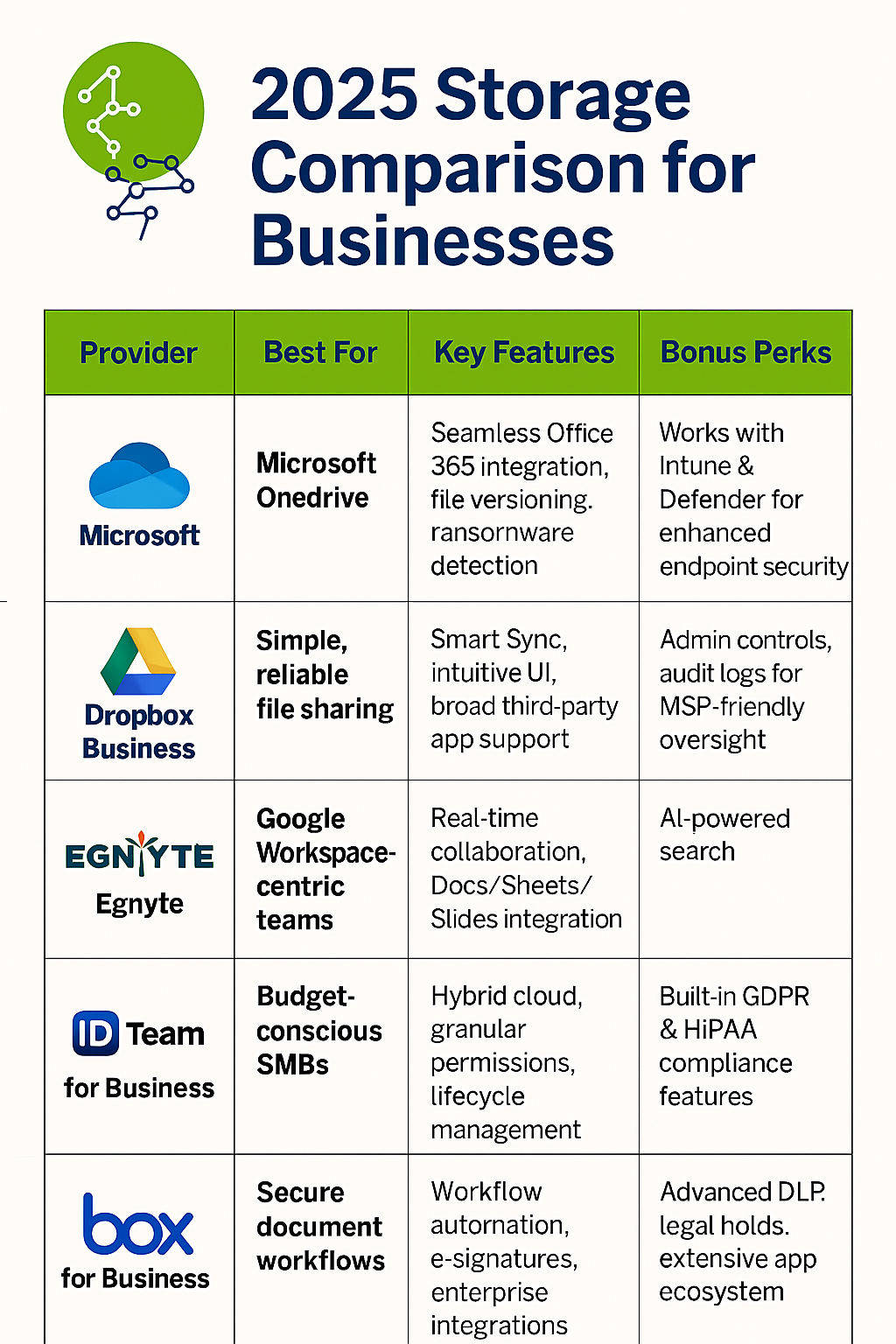As a small business owner, you’ve got enough on your plate—managing operations, keeping customers happy, and staying ahead of the competition. The last thing you need is to worry about where your files are stored or whether your data is secure. That’s where cloud storage comes in.
But with so many providers out there, how do you choose the right one? Let’s break down six top options, with pros and cons to help you make the best decision for your business.
1. Microsoft OneDrive for Business
If your business already uses Microsoft 365, OneDrive is a natural fit.
Pros:
- Seamless integration with Outlook, Teams, and Office apps
- Strong security features like ransomware detection and file versioning
- Easy collaboration with internal and external users
Cons:
- Can feel complex for non-Microsoft users
- Limited offline access without syncing files manually
Best for: Businesses already using Microsoft 365 and looking for tight integration
Dropbox is known for its simplicity and ease of use.
Pros:
- User-friendly interface with drag-and-drop functionality
- Smart Sync saves local storage space
- Great for sharing large files with clients or vendors
Cons:
- Fewer built-in productivity tools compared to Microsoft or Google
- Advanced features can get pricey as your team grows
Best for: Teams that prioritize simple, reliable file sharing
3. Google Drive (for Business)
Part of Google Workspace, Drive is ideal for real-time collaboration.
Pros:
- Live editing in Docs, Sheets, and Slides
- Excellent mobile access and AI-powered search
- Affordable pricing tiers
Cons:
- Less robust file permission controls than some competitors
- May require training if your team isn’t familiar with Google tools
Best for: Businesses already using Gmail or Google Workspace
4. Egnyte
Egnyte is built for businesses in regulated industries like healthcare or legal.
Pros:
- Hybrid cloud options for local and cloud access
- Granular permission settings and audit trails
- Built-in compliance tools (HIPAA, GDPR, etc.)
Cons:
- More expensive than basic cloud storage options
- May be overkill for businesses without strict compliance needs
Best for: Businesses with sensitive data or regulatory requirements
5. IDrive Team
IDrive is a budget-friendly option that includes backup and sync features.
Pros:
- Affordable plans with generous storage
- Supports endpoint backup and remote device management
- Snapshot-based recovery for accidental deletions
Cons:
- Interface isn’t as modern or intuitive as others
- Limited collaboration tools
Best for: Small businesses needing low-cost backup and storage
Box is designed for secure document workflows and enterprise-level collaboration.
Pros:
- Workflow automation and e-signature support
- Strong data loss prevention (DLP) and legal hold features
- Integrates with over 1,500 apps
Cons:
- Higher learning curve for small teams
- Premium features come at a premium price
Best for: Businesses that need secure document management and automation
Comparison Chart

Final Thoughts
Choosing the right cloud storage provider isn’t just about price—it’s about finding a solution that fits your workflow, your team, and your future growth. Whether you’re looking for simplicity, security, or seamless integration, there’s a provider that fits your needs.
Click here to read more of our blog posts and stay up to date with the latest in IT News.